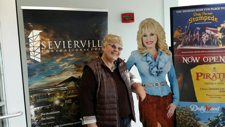From Your Minister
July 1, 2020Podcast: Download (Duration: 6:10 — 5.7MB)
Subscribe: More
Letting go can be a spiritual practice. I should know, I’ve been doing it for a while as I prepare to leave CLF. “This is the last Christmas.” “This is the last board meeting.” “This is the last learning fellow I will choose.” And now, “This is the last Quest column I will write.”
It’s odd, because of the schedule Quest keeps, that when I write this “last column” isn’t when I’m about to walk out the door. I have many, many more endings between now and then. But this particular one—this last column—has been weighing on me, because so many of you talk to me about my columns, and they are the grounds for many of our relationships.
And this is the last one. Ten years writing a column “from your minister” each month, some better than others, some written with ease and some sweating bullets…that won’t be happening anymore. That time is ending.
When I name an ending, I bless it. I have tried to bless all of my columns, but there is a poignancy in the knowledge that I am letting go with this one.
What shifts are involved so that letting go becomes a spiritual practice? Many endings come as surprises, so it is a gift to be purposeful and intentional in letting go. Letting go as a spiritual practice begins with deepened attention. Putting more time and focus on what I am doing. I am writing a column, as I have more than 100 times before. And yet, I am simultaneously doing something else. I am letting go of our relationship. I am saying goodbye.
So, I imagine sending this column off on its way into the world without me, as I have seen lanterns released into the sky or on tiny floating boats into water at various Japanese and Chinese festivals I have attended. I imagine letting go of it as if I’m tossing a piece of wood into the river and watching it float away. I imagine the column as a train pulling out of the station, leaving me behind on the platform waving.
It’s easier not to deepen into the letting go, to avoid the grief and pain, to pretend things go on as usual. I’m not good at saying goodbye. I tell myself, that within the tiny world of UUism, I’m not disappearing. You’re not disappearing. But our special relationship—me as minister, you as my people—is shifting. It has been such an incredible privilege to be your minister. I will always cherish that, and in August I will leave. I will wonder about your further adventures without me. I will miss our contact—your notes and letters, our phone calls.
I’ll be letting go of social media connections with you. That will be complicated, for sure. As a spiritual practice, this means breathing deeply into the acceptance that I won’t know about your lives. I can’t become your friend. I need to step back and give space to my successors to become your ministers, as Rev. Jane Rzepka stepped back to allow me to become your minister.
It’s easy to get sidetracked from grief and separation into anger or bitterness or a sense of abandonment. I remember learning this starkly as a young adult, when I lived in a large cooperative house. We saw many people come and go. It was a rare person who didn’t leave angry, or leave with us angry at them. Long-cherished friends would suddenly become either critical harpies or spaced-out fools who left the food on the counter to rot and didn’t lock the front door.
Letting go as a spiritual practice means paying attention to my own emotions and those of others as part of the process, and not getting distracted from the need to grieve.
 I may or may not have shared with you that I am a huge Dolly Parton fan. (Huge!) Dolly’s hit song, “I Will Always Love You,” made epic by Whitney Houston, was written to Porter Wagoner, with whom she co-hosted a TV show when she was very young. She had known she had to leave for a while. They had fought about it. Finally, she wrote that song for him, sat him down and sang it. When he heard it, he knew she meant business. The purity of her need to go shines through the song.
I may or may not have shared with you that I am a huge Dolly Parton fan. (Huge!) Dolly’s hit song, “I Will Always Love You,” made epic by Whitney Houston, was written to Porter Wagoner, with whom she co-hosted a TV show when she was very young. She had known she had to leave for a while. They had fought about it. Finally, she wrote that song for him, sat him down and sang it. When he heard it, he knew she meant business. The purity of her need to go shines through the song.
Letting go as a spiritual practice means staying centered in the love, but still knowing that it is time to let it go, and to surrender to what is true: Every ministry has its time, and my time with CLF is through. I can’t wait to see who comes next, and what they will do! By the time you read this, we hope to know who is arriving, but as I write it, I don’t. That, too, is part of letting go.
 Ultimately, we will all be letting go of all we know, on that edgeless edge, as we depart this earth for unknown parts. May each small opportunity to let go teach us a little bit better how to accomplish that big one! And in the meantime, do know that though we won’t be in touch, I will always love you!
Ultimately, we will all be letting go of all we know, on that edgeless edge, as we depart this earth for unknown parts. May each small opportunity to let go teach us a little bit better how to accomplish that big one! And in the meantime, do know that though we won’t be in touch, I will always love you!
- From Your Minister - July 1, 2020
- From Your Minister - June 1, 2020
- From Your Minister - May 1, 2020
Comments are closed.
Quest Monthly Print Edition
Recent Issues
Latest Spiritual Reflection Posts
Weekly Newsletter
About
Quest for Meaning is a program of the Church of the Larger Fellowship (CLF).
As a Unitarian Universalist congregation with no geographical boundary, the CLF creates global spiritual community, rooted in profound love, which cultivates wonder, imagination, and the courage to act.
Contact
Church of the Larger Fellowship Unitarian Universalist (CLFUU)
24 Farnsworth Street
Boston MA 02210

Well, Meg we have not had the chance to be correspondents. My failure I guess.
Anyway, being a part of CLF is a valued part of me and I appreciate all you have done to keep it alive and growing. I cannot imagine being a convict without someone to write to.
Your words on letting go are pertinent to me as I am 83 now and realize each day may be my last so revel in it. I had a good life with challenges I met and I am left well taken care of – purely by luck.
so good luck on your future efforts and pleasures. Gardening is a pleasure of mine but is also tiring. so much for good things.
My best to you.